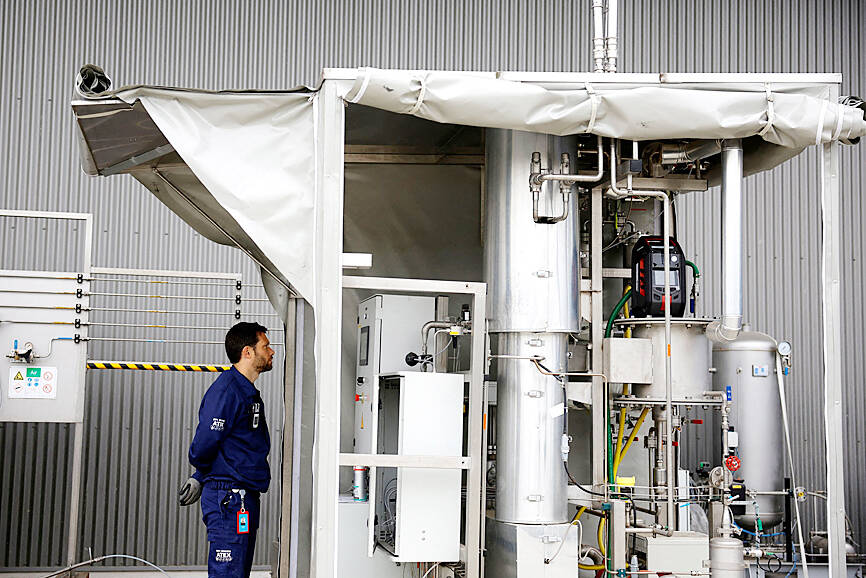The share of bank finance going to renewable energy rather than fossil fuels has changed little in six years, raising questions about how fast lenders are pushing energy clients to become greener, according to research published yesterday.
Since 2016 renewable energy has taken 7 percent of US$2.5 trillion in bank loans and bond underwriting for energy activities, according to a report commissioned by environmental groups including Sierra Club and Fair Finance International.
The total annual sum banks have facilitated into renewable energy rose to a high of US$34.6 billion in 2021, from US$23.2 billion in 2016, but the amount going to fossil fuels increased too, keeping renewables’ share broadly the same.

Photo: Reuters
Last year the share of renewable energy in funding was 8 percent while in 2021 and 2020 it stood at 10 percent and 7 percent respectively.
“Banks’ financing to fossil fuels should be phasing out as financing to renewables increases drastically to have any chance of reaching the world’s — and their own — climate goals,” said Ward Warmerdam, researcher at Profundo, which compiled the data.
Lenders say they must finance fossil fuels given global energy needs, but that they are helping firms transition to low-carbon future.
Renewable companies often tap private and government finance too, they added.
“This report does not provide a comprehensive view of clean energy investment,” said a spokesperson for The Glasgow Financial Alliance for Net Zero, a major grouping of financial institutions
The spokesperson pointed to analysis from the International Energy Agency which suggested that between 2021 and last year around 48 percent of total energy investment went to low-carbon energy supply.
JPMorgan Chase & Co, Citigroup Inc and Barclays PLC’s renewable energy share was 2 percent between 2016 and last year and the Royal Bank of Canada’s 1 percent, the report said. Citi declined to comment. JPMorgan, Barclays and RBC did not respond to requests for comment.
The research covered 60 of the world’s biggest lenders and 377 energy firms. It excluded biomass, nuclear and carbon capture and storage from its renewable energy definition.

Nissan Motor Co has agreed to sell its global headquarters in Yokohama for ¥97 billion (US$630 million) to a group sponsored by Taiwanese autoparts maker Minth Group (敏實集團), as the struggling automaker seeks to shore up its financial position. The acquisition is led by a special purchase company managed by KJR Management Ltd, a Japanese real-estate unit of private equity giant KKR & Co, people familiar with the matter said. KJR said it would act as asset manager together with Mizuho Real Estate Management Co. Nissan is undergoing a broad cost-cutting campaign by eliminating jobs and shuttering plants as it grapples

TEMPORARY TRUCE: China has made concessions to ease rare earth trade controls, among others, while Washington holds fire on a 100% tariff on all Chinese goods China is effectively suspending implementation of additional export controls on rare earth metals and terminating investigations targeting US companies in the semiconductor supply chain, the White House announced. The White House on Saturday issued a fact sheet outlining some details of the trade pact agreed to earlier in the week by US President Donald Trump and Chinese President Xi Jinping (習近平) that aimed to ease tensions between the world’s two largest economies. Under the deal, China is to issue general licenses valid for exports of rare earths, gallium, germanium, antimony and graphite “for the benefit of US end users and their suppliers

Dutch chipmaker Nexperia BV’s China unit yesterday said that it had established sufficient inventories of finished goods and works-in-progress, and that its supply chain remained secure and stable after its parent halted wafer supplies. The Dutch company suspended supplies of wafers to its Chinese assembly plant a week ago, calling it “a direct consequence of the local management’s recent failure to comply with the agreed contractual payment terms,” Reuters reported on Friday last week. Its China unit called Nexperia’s suspension “unilateral” and “extremely irresponsible,” adding that the Dutch parent’s claim about contractual payment was “misleading and highly deceptive,” according to a statement

The Chinese government has issued guidance requiring new data center projects that have received any state funds to only use domestically made artificial intelligence (AI) chips, two sources familiar with the matter told Reuters. In recent weeks, Chinese regulatory authorities have ordered such data centers that are less than 30 percent complete to remove all installed foreign chips, or cancel plans to purchase them, while projects in a more advanced stage would be decided on a case-by-case basis, the sources said. The move could represent one of China’s most aggressive steps yet to eliminate foreign technology from its critical infrastructure amid a